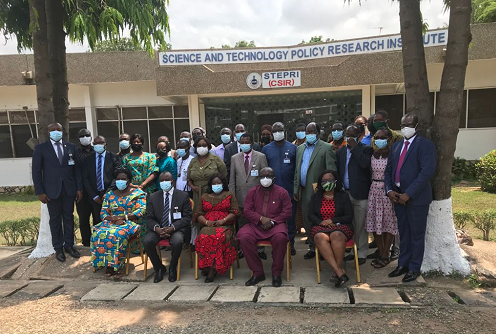
CSIR begins processes to amend Act 521 of 1996
The Council for Scientific and Industrial Research (CSIR) has initiated a process to amend the CSIR Act 521 of 1996.
The CSIR Act 521 was enacted in 1996 to re-establish the CSIR to promote, encourage and regulate research and the application of science and technology in development as well as its related matters.
Speaking at the first stakeholders meeting on the amendment of the CSIR Act 521 in Accra on Wednesday, August 18, 2021, the Director of CSIR- Water Research Institute, Professor Mike Osei Atweneboa, said the focus of the amendment is to obtain full legal backing to establish two institutes — CSIR-Biomedical Pharmaceutical and Public Health Research Institute (CSIR-BPPHRI), and CSIR- Engineering Research and Development Centre (ERDC).
They also want the name of Institute for Scientific and Technological Information to CSIR- Electronics, Communication and Information Research Institute (CSIR-ECIRI).
“The amendment of the CSIR Act 521 of 1996 will include the creation of new institutes which are CSIR-Engineering Research Institute (CSIR-ERI) and the CSIR-Biomedical Pharmaceutical and Public Health Research Institute (CSIR-BPPHRI) and the change of name Institute for Scientific and Technological Information to CSIR- Electronics, Communication and Information Research Institute (CSIR-ECIRI)”, he said.
Prof. Atweneboa said the purpose of the amendment is to prepare the country to develop, pilot, and evaluate emerging technological interventions designed to improve human and economic development.
Challenges
In a presentation, the Director-General of CSIR, Prof. Victor K. Agyeman underscored the need for the CSIR Act 521 of 1996 to be amended, explaining that there are a number of policy challenges that would require a review after 23 years of its enactment.
He pointed out that one of the challenges of the CSIR Act 521 was the large number of CSIR council members, adding that the large number of council members impedes rapid decision-making.
“The number of council members is too many. We have 21 council members and this makes it expensive to run council," he said.
Prof. Agyeman noted that the CSIR Act 521 of 1996 is mainly agricultural focused, hence calling for the need to invest in emerging areas of research such as innovation research, Nanoscience, and Al Robotics.
He also pointed out that the creation of new CSIR institutes will address emerging areas such as innovation, engineering and electronics and information communication.
Reforms
In 2016, CSIR outlined a CSIR wide-agenda for transformational change. The agenda sought to realign research in CSIR to focus on seven thematic areas which are in line with the development priorities of the government and her development partners.
As part of the process to address the challenges of the CSIR Act 521, a committee has been established to oversee the amendment of Act 521 of 1996.
The proposed amendment of the CSIR Act 521 of 1996 will include the creation of two new institutes, namely CSIR-Engineering Research Institute ( CSIR-ERI) and the CSIR-Biomedical Pharmaceutical and Public Health Research Institute (CSIR-BPPHRI).
It will also include the change of name of the CSIR- Institute for Scientific and Technological Information to CSIR- Electronics, Communication and Information Research Institute (CSIR-ECIRI).
The proposed amendment will seek to reduce the membership of the council members from twenty-one (21) to thirteen (13).
It is also seeking to be given the mandate to establish a graduate college to fully train people in Science, Technology, Electronics and Information Communication etc.
